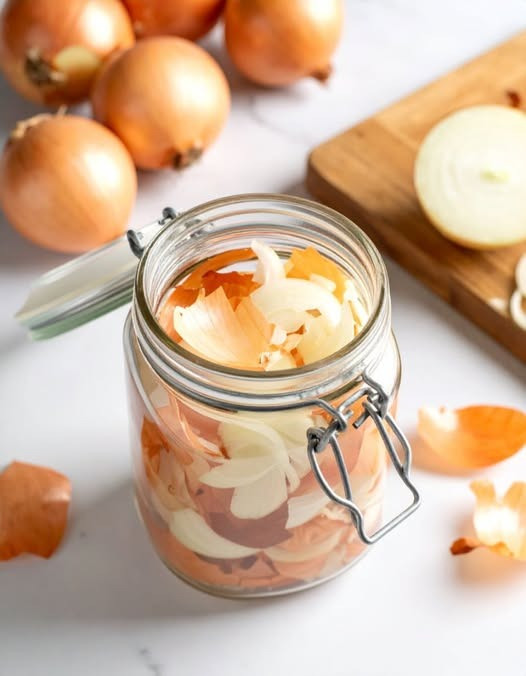ADVERTISEMENT
Onion skins are often discarded as waste, but these papery layers hold a treasure trove of uses that can benefit your home, garden, and even your health. Instead of tossing them into the trash, consider the myriad ways you can repurpose onion skins to reduce waste and add value to your daily life.
From enhancing the flavor of your dishes to providing natural solutions for household needs, onion skins are an underappreciated resource. In this article, we'll explore 11 creative and practical ways to utilize onion skins, turning what was once considered waste into a valuable asset.
Advertisement
1. Make a Flavorful Broth
Onion skins can be used to make a rich and flavorful broth that serves as a perfect base for soups, stews, and sauces. Simply collect the skins from 3-4 onions and add them to a pot of water along with other vegetable scraps like carrot tops and celery leaves. Bring the mixture to a boil, then reduce the heat and let it simmer for about an hour. Strain the liquid, and you'll have a delicious broth that adds depth and complexity to your dishes. The natural pigments in the onion skins also impart a beautiful golden hue to the broth.
2. Create Natural Dye
Onion skins are a fantastic source of natural dye, perfect for coloring fabrics, Easter eggs, or even paper. To create a dye bath, gather a generous amount of onion skins, roughly from 10-15 onions, and place them in a large pot. Add enough water to cover the skins and bring to a boil. Reduce the heat and let it simmer for about 30-45 minutes. Strain the liquid and use it to dye your chosen materials. The result is a warm, earthy color that varies from yellow to deep orange, depending on the type of onion and the concentration of the dye.
3. Enhance Your Compost
Onion skins are an excellent addition to your compost pile, providing essential nutrients that enrich the soil. They break down relatively quickly and contribute to the overall health of your compost. Simply toss the skins into your compost bin along with other kitchen scraps. It's important to mix them well with other materials to ensure proper aeration and decomposition. Over time, the skins will decompose and add valuable organic matter to your compost, which can then be used to nourish your garden.
4. Use as a Garden Mulch
Using onion skins as mulch can help retain moisture in the soil, suppress weeds, and add nutrients as they break down. Spread a layer of onion skins around the base of your plants, ensuring they are not too thick to prevent air circulation. This natural mulch will gradually decompose, enriching the soil and promoting healthy plant growth. Additionally, the slight odor of onion skins can deter some pests, providing an added layer of protection for your garden.
5. Add to Homemade Cleaners
Onion skins can be infused into homemade cleaning solutions to boost their effectiveness. To make an onion skin cleaner, place a handful of skins in a jar and cover with white vinegar. Seal the jar and let it sit for about two weeks, shaking occasionally. Strain the liquid and dilute it with an equal amount of water. This infused vinegar can be used as a natural cleaner for surfaces, cutting through grease and grime while leaving a fresh scent. The antimicrobial properties of onions also enhance the cleaning power of the solution.
6. Infuse Vinegar for Cooking
ADVERTISEMENT
